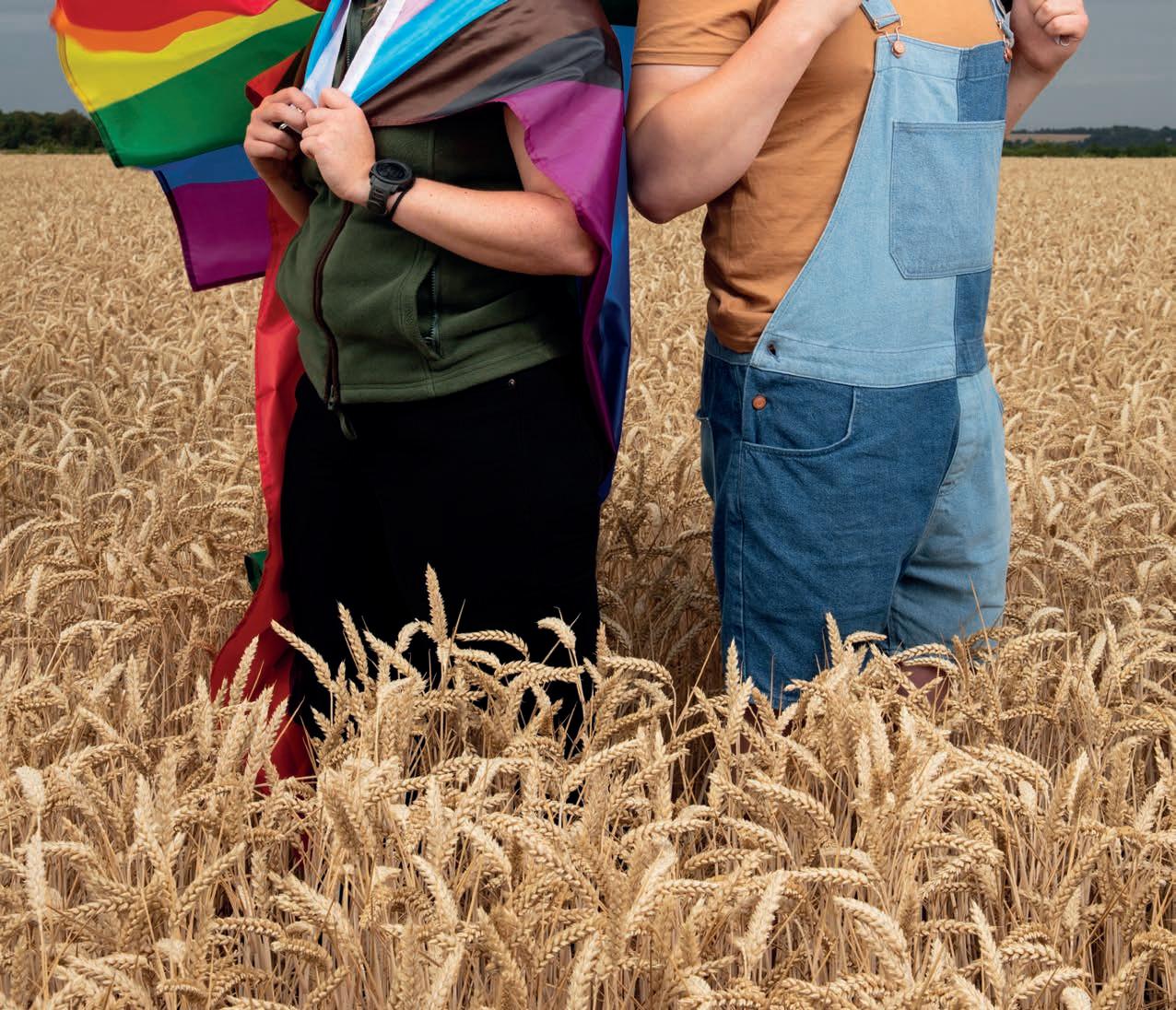




































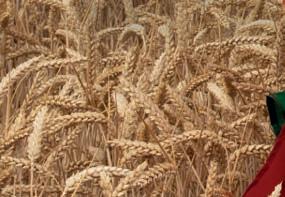






The magazine for young farmers September 2022 S&YF AMBASSADOR TAKEOVER EDITION MENTAL HEALTH Strike the right balance Friendship, allyship and ambassadorship DIVERSIFICATION Spreading the risk on your farm



September 20222 ALL-NE W, ALL-ELE CT RIC FI AT 500 UP TO 199 MI LE RA NG E † †These gureswereobtainedafterthebatteryhadbeenfullycharged.TheNewFiat500is abatteryelectric vehiclerequiringmainselectricity forcharging.Thereis anewtestforfuelconsumption,CO2andelectric range gures.Theelectric rangeshownwasachievedusingthenew testprocedure.Figuresshownareforcomparabilitypurposes.Onlycompareelectric range gureswithothercarstestedtothesametechnical procedures.These guresmaynotre ectreallifedrivingresults,whichwilldependupon anumberoffactorsincludingthestartingchargeofthe battery,accessories tted(postregistration),variationsinweather,drivingstylesand vehicleload. *Membereligibilityrulesandtermsandconditionsapply.All vehiclesofferedaresubjectto availability.ThePrivilegeProgrampricesinclude VAT, roadfundlicence, rstregistrationfee,deliveryandnumberplates.FiatChryslerAutomobilesUKLtdreservestherighttoalter,amendor withdraw pricesandofferswithoutnotice.ThePrivilegeofferscannotbeusedinconjunctionwithanyother offersorincentives,includingretail,Af nityand PrivilegeProgramconsumerincentives. AC CESSEXCLUSIVEOFFERSWITH THEFIATP RIVILEGEPROGRAM* FiatUKisdelightedtooffer exclusivediscountstoeligibleNFUmembers* acrossitsmodel range,as well as exceptionaldealsonnewJeep,AlfaRomeo, AbarthandFiatProfessional vehicleswiththeFCAPrivilegeProgram. Offering awidechoiceofmodelstosuitanybudget,theschemeprovides arangeof nanceoptionstomakeyournew vehiclepurchase evenmoreaffordable. Formoreinformationvisit fcaprivilegeprogram.co.uk
PUBLISHED BY:
NFU, Agriculture House, Stoneleigh Park, Stoneleigh, Warwickshire, CV8 2TZ

FILLED WITH WORDS BY:
Orla McIldu , Gareth Staples-Jones, Mike Wilkins, Bizza Walters, Rebecca Wilson, Mary Raymond, Erin McNaught, Jess Langton, Emily Brown, Dan Hawes, Thomas Saunders, Edward Lord, Hannah Buisman, Sophie Bould-Lynch, Sian Davies, Maisie Bruce, Claire Hartry, Mark Weaver
DESIGNED John Cottle
COVER Cottle
TO Alan Brown alan.brown@nfu.org.uk
CONTACT:
S&YFAP TAKEOVER
It's been quite the summer hasn't it? Between the hottest harvest we've ever known, the passing of Queen Elizabeth II and the instalment of a new Prime Minister, a lot can happen between editions of this magazine.
Luckily, I've had the best team of writers and editors I could have hoped for when pulling together this edition of Student Farmer; our NFU Student & Young Farmer Ambassadors! They've each chosen to write about things that they're passionate about, meaning this edition is jam-packed with real-life farming stories from across England and Wales.

You might notice our joyous Pride-themed front cover – Emily and Mike have teamed up to, quite literally, fly the Pride flag for our industry. Read all about why it's important to stand up and be counted, either as an ally or as an LGBTQ+ community member, on page 12.

Speaking of feeling proud, it always amazes me to see the innovation happening on farms around the country. This issue sees our ambassadors talk net zero agri-practices, diversification ideas and even the strawberry supply chain in their articles. I've learned a huge amount and have thoroughly enjoyed reading every single piece, and I'm sure you will too!


Finally, I've not forgotten that it's the start of a new school, college and university year for a lot of you. If you're looking for something to cook to impress your mates in halls, check out Bizza's lamb recipe on page 30. Have a brilliant term, and if you fancy a challenge in 2023, find out how to become a Student & Young Farmer Ambassador on page 8 – it could be your incredible story I'm reading this time next year!
Orla McIldu Editor, Student Farmer
Contents
BY:
IMAGE BY: John
ADVERTISE, CONTACT:
studentfarmer@nfu.org.uk /StudentFarmer @studentfarmer @studentfarmer 06 Country to town and back again 08 Are you up for the S&YFAP challenge? 10 Sign up for free NFU membership 12 Pride in our profession 16 Getting that farm/life balance 18 Branching out by yourself 19 Accessibility is key 22 The science in soil 23 Take a break with a book 24 Ways to be green on farm 25 Profitable and sustainable 26 Supplying strawberries 28 Upping your social media game 29 Routes into agriculture 30 Don't get scurvy 32 Why should I diversify? 35 Putting yourself out there 36 Studying shoppers 38 Succession tips 26 12 32 September 2022 3






Vale Trainingoffercoursescovering Health&Safety•Skills•Management Allofwhich canbetailoredtomeetthe client’spersonalneeds Lowinstructortotraineeratios Lantra,BASIS,CityandGuilds&NPORSregistered NPTCassessmentsavailable Formoreinformationcontactusatanyofthefollowing Tel:01296612201 Email:info@valetraining.co.uk www.valetraining.co.uk Awide rangeof skillstrainingalllevels cateredfor VALETRAININGSERVICES LTD FIRSTFORRURALANDLANDBASEDTRAINING LEADTHE WAY SRUCis acharity registeredinScotland:SC003712 Findus on FindusFacebook Fa @srucstudy www.sruc.ac.uk/opendays Formoreinformationphone:0800269 Fo453 rmoreinformationphone:0800269 453


Whowillyou unearth? Join Muddy Matches; theUK'soriginal, award-winninghome offarmerdatingand country-lifelove. MUDDYMATCHES.CO.UK Meet, match,dategenuine countrysingles.
Starting conversations
It was farm to city and back again in 24 hours for the NFU Student & Young Farmer Ambassadors as they tackled the tough issues in farming on a recent trip


The NFU Student & Young Farmer Ambassadors took time out of their busy schedules for a visit to Hampshire and London in May. NFU Next Generation Forum member Flavian Obiero initially hosted the group on farm in Hampshire, before James Gray MP gave the ambassadors a guided tour of the Palace of Westminster.
Flavian reflected on meeting the ambassadors by saying: “I thoroughly enjoyed showing the ambassadors around our farm. It’s always good to share whatever little knowledge we’ve got with each other. I also enjoyed our equality, diversity and inclusion chat after lunch. The future is definitely bright with this Student & Young Farmer cohort about!”
NFU public affairs graduate Neeve McGinty welcomed the group to the NFU’s Westminster office before leading them to meet Mr Gray. She said: “After the tour, there was a 90-minute Q&A where the ambassadors were able to learn more about how the agriculture industry can engage with politics to create change. The group not only asked good questions to learn more about agri-politics, but landed farming messages in a professional and politically sensitive way, which is a real skill to have. You wouldn’t have known that for the majority, it was their first time meeting an MP.
“There were productive conversations surrounding food security, ELMs, Farming
Rules for Water, net zero, supply chains, diversity within agriculture and support for new entrants. The group candidly reflected on their own experiences and highlighted what support they need as the next generation of British farmers.” Following the meeting, ambassador
Bizza Walters West Midlands
Mike Wilkins (who farms in Mr Gray’s constituency) invited him to visit his farm, and this was met with enthusiasm. These farm visits provide another opportunity to build strong relationships with MPs in support of the NFU’s political lobbying.
We had the most fantastic two days on our trip to Hampshire and to the Houses of Parliament with James Gray MP, as well as the NFU Westminster o ce. Hearing Flavian’s story really solidified to me how important equality, diversity and inclusivity is within this industry, to ensure we can all work together to produce the best quality food through a sustainable supply chain. This led on to conversations with James Gray MP on the importance of food security and protecting British agriculture, especially during such uncertain times with prices rising by the minute.
As always, I am so grateful to work alongside this wonderful group of NFU Student & Young Farmer Ambassadors. They are an inspiring group of individuals from all over the UK, and it’s great to have such in-depth discussions about all sorts of topics within agriculture.
Thank you to the NFU for hosting a very memorable trip, and as always I can’t wait for what else is in store.
John Cottle
S&YFAP
September 20226
Mike Wilkins

South West
I had a truly wonderful time on a wide-ranging trip with my fellow NFU Student & Young Farmer Ambassadors!


Firstly, we visited Flavian Obiero, near Basingstoke. It was fascinating learning about his methodologies for running his mostly outdoor pig enterprise, especially given the current climate for the pig industry in the UK. Flavian’s attitude and approach towards how he runs his business was incredibly inspiring and refreshing, not to mention his evident abundance of knowledge and enthusiasm.


With Flavian we were fortunate to have an open discussion as a group about inclusivity and diversity within the agricultural industry. This is a topic that our industry often sadly struggles to embrace. Listening to the di ering experiences of people within our group was humbling, emotive, and at times upsetting. As a queer man working in agriculture, I have experienced a degree of discrimination that I hope we can eradicate in the near future; but to do this we must proactively confront discrimination when we see it.
On the second day of our trip, as well as visiting the NFU’s London o ce, we were very fortunate indeed to have a tour of the Palace of Westminster. While inside Parliament, we visited some fantastically prestigious locations, the most armpinching of which being the House of Commons and the House of Lords (sadly we didn’t get to bang our fists on the dispatch box, nor sit in the speaker’s chair and yell ‘order’!).
Additionally, we were able to spend more than an hour in Committee Room 14 questioning James Gray (my local MP here in North Wiltshire) about everything that the government is doing (or not doing) to support and facilitate farmers and our industry to live up to the full productivity and environmental potential that we harbour.

S&YFAP
September 2022 7
Fancy a challenge?
WHAT IS IT?
The Student & Young Farmer Ambassador Programme is a year-long series of events designed to give Student & Young Farmer members under the age of 27 the opportunity to impact the future of the agricultural industry by working with the NFU and to put their own stamp on the future of British farming.


WHY TAKE PART?
• This is an opportunity to represent the younger generation of farmers within the UK's biggest farming membership organisation
• Create long standing relationships with like-minded people from all farming sectors around the country
• Experience new aspects of the agricultural industry, from horticulture to dairy
• Help the farming industry become more progressive and break boundaries
• Be at the heart of political change as it unfolds
• It will be an amazing asset to add to your CV
• Promote yourself, your college or your business locally and nationally
• Increase your knowledge of the inner workings of the NFU
• You will receive training to enable you to write for national publications, present to schools, speak to the media and to engage with MPs
WHAT’S THE APPLICATION CRITERIA?
• Be an NFU Student & Young Farmer member (it’s free! Sign up at NFUonline.com/student)
• Aged between 18 and 26 years (on 1 January 2023)
• To be located in England or Wales
• Have a vested interest in farming and rural a airs
• Available to attend all events with confirmed dates (see timetable, right)
• Have an interest in speaking to the media or writing content for various NFU publications
• Be committed to promoting the values of inclusivity and kindness in the industry
WHAT DOES IT COST?
The NFU will ensure that the programme is free for participants, and that ambassadors are not left out of pocket. All food, overnight stays and travel expenses will be covered as long as participants attend all events.
WHEN DO APPLICATIONS OPEN?
Applications are open between 31 August and 31 October 2022. Following a first-stage application form, successful candidates will be invited to a final-stage interview in November 2022.
READY TO APPLY?
It's that time of year again when the team is getting ready to recruit its newest bunch of NFU Student & Young Farmer Ambassadors
Visit NFUonline.com/Ambassadors to get your application in!
S&YFAP
September 20228
INCLUSIVITY PLEDGE
We believe the more diversity within agriculture, the more innovative and sustainable the future of farming will be. In line with the NFU’s value of inclusivity, the Student & Young Farmer Ambassador Programme has always welcomed applicants from di erent cultures, backgrounds and perspectives. We especially welcome applications from people who feel their community has, so far, been underrepresented in the agriculture industry or in the S&YFAP group, be that in relation to (but not limited to) their race, colour, disability, religion, sexual orientation, gender identity and/or expression.


What do other ambassadors think?

Thomas Saunders East Anglia representative, 2021/22

“I hoped the NFU Student and Young Farmer programme would be insightful, fun and beneficial, but it has far exceeded my expectations. As ambassadors, we have become not just a group of people interested in the future of farming, but great friends too. The trips have been fantastic and the opportunity to attend the NFU’s Summer Reception in the House of Commons was the icing on the cake for this fantastic programme. I cannot thank the NFU enough for this amazing opportunity. If you are in doubt about whether to apply or not, then just do it! ”
Timeline





January 2023: at NFU HQ, Stoneleigh

February 2023:
Attend Conference across two the ICC political sessions, workshops,




March 2023:

Spend
April 2023: Westminster
May 2023:
Help Young Farmer Takeover
June to August 2023:
September 2023:
November 2023: Lord Mayor’s

January 2024:













Timetable a later stage.
Zoe Legg South West representative, 2020/21

“I would say the biggest thing the Student & Young Farmer Ambassador Programme has given me is confidence. I feel like it has given me a valid voice within the industry and encouraged me to share my views and opinions on elements of the agricultural industry that will a ect my future.”
Erin McNaught
NFU Cymru respresentative, 2021/22
“The Student & Young Farmer Ambassador Programme has given me a huge insight into the dynamic world of agriculture. We've visited many exciting places, such as the Houses of Parliament, we've met some very influential people and we have also been given the support and opportunity to continue on our career journey in the industry. But most importantly, I'm proud to be in a little community of like-minded ambassadors that I know I can always call upon.”
Eveey Hunter
East Anglia representative, 2020/21
“The Student & Young Farmer Ambassador Programme has led me to where I am today, starting my first term chairing the NFU Next Generation Forum. I will be forever grateful for the opportunities presented to me, namely sharing my opinions through interviews and articles, as well as giving me a huge confidence boost in using my voice to promote British farming and all the issues, di culties and that come with it.”

challenges
S&YFAP
Two-day induction programme, held
NFU
days at
in Birmingham, including attending
sector breakouts, formal dinner and an overnight stay
a day with your regional colleagues to learn about what happens on a regional and local level
Visit the NFU’s external a airs team in
and go on a tour of the Houses of Parliament
to guest-edit the NFU Student &
Edition of Student Farmer magazine
Represent the NFU at agricultural shows and events during the summer
Support the NFU’s Back British Farming Day in lobbying government to see the value of British food and farming
Represent the British agricultural industry at
Show in London, including an overnight stay the night before
Handover to next cohort of ambassadors
is subject to change, and events may be removed, rescheduled or changed. Specific dates will be confirmed at
September 2022 9

























































FREE STUFF? NFU Student & Young Farmer membership is free to students and YFC members. It allows you to have a say and to contribute towards the future of agriculture, and you will benefit from access to experts in policy, food and farming, plus bonus perks! Join the largest and most influential farming association and receive: • Student Farmer magazine and British Farmer & Grower or Farming Wales magazine delivered to your door • The latest news and briefings from our policy experts in NFU Bulletin and sector-specific and regional e-newsletters • Discounted member rates to attend NFU Conference and other events • Access to member-only content on NFUonline and the NFU App with a unique login • 10% saving on B+E Trailer Training • Welfare of Animals in Transport test for £35 (+VAT) • 15% o airport parking and hotels with APH • Savings on Dickies Workwear online • Huge savings on Merlin Entertainment (Alton Towers, Thorpe Park and more) • Save up to 25% on ATV helmets and safety clothing from Spada Sign up SCAN THE QR CODE OR VISIT NFUONLINE.COM TO JOIN The magazine for young farmers Beyond advocacy What's the next step in standing up forthe future of farming? May 2022 LIFTING THE LIDON PARLIAMENTHow you can influencegovernment decisions CRISIS IN UKRAINE What's happening, howfarming is a ected andwhat the NFU is doing #NFU22 Behind the scenes atNFU Conference 2022 001_SF_MAY22 FINAL.indd 1 12/04/2022 12:32:51 September 202210 TRACTORSFORHIRE YEWTREE FARM,A5,CRACKLEY BANK,SHIFNAL,TF118QT EMAIL: SALES@DAVISON-FORKLIFT.CO.UKTEL: 01952915060 AMALCOLMHARRISON COMPANY NewHolland T7.210 From £455per Week BO OKNO W DAVISONHIRE
















September 2022 11 Are youahighlymotivatedproblemsolverwithstrongleadership potential?Then youwillrelishthechallengeofMDS, agraduate programmelikenoother. Overtwoyears youwilltakeon roleswithrealresponsibilityinfour different companies,whilstalsostudyingfor aLevel 5Leadership &Managementqualification.Thiswillstretch youbeyondmost othergraduateschemes,giving youaccountabilityfromdayone butwiththesupportandtraining youneedtosucceed. If youthinkyou’reready, contactusnow. Visit www.mds-ltd.co.uk toapply. Are you readyto leadinfood andfresh produce? Discovermoreat www.mds-ltd.co.uk Followuson socialmedia:
Farming with Pride

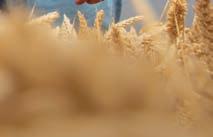
 Editor Orla McIldu speaks to NFU Student and Young Farmer Ambassadors Mike Wilkins and Emily Brown about Pride 2022
Editor Orla McIldu speaks to NFU Student and Young Farmer Ambassadors Mike Wilkins and Emily Brown about Pride 2022
Farming’s presence was felt when NFU Student & Young Farmer Ambassadors Emily Brown and Mike Wilkins joined three other members from charity Agrespect in attending Manchester Pride this summer. They were also joined by ally and fellow ambassador, Gareth Staples-Jones.
Emily says: “We are proud to work with Agrespect, an organisation which promotes diversity and inclusion in the countryside. The aim is to demonstrate that the countryside and rural careers can be fun, safe and welcoming places for everyone, regardless of gender identity, ethnicity or sexual orientation.
“It should never be forgotten that Pride is a protest (there is still a significant amount of progress to be made) but also an opportunity to celebrate diversity and inclusion as well as remembering those who have bravely fought over the years to make change happen. The Stonewall Riots in New York in 1969 acted as a catalyst for the gay liberation movement; the first Pride Protest in the UK took place in 1972 in London.”
I was lucky enough to catch up with Mike and Emily after their exciting weekend, and here’s what they had to say:
What does it mean to have a farming presence at Pride?
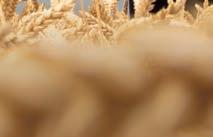



Mike: This was my third Pride event, and at each one I have been overwhelmed by the love, joy and acceptance embodied by all those present. Particularly when working in rural/farming environments, I often feel that I have to filter or stifle the queerer aspects of myself. In representing the NFU at Manchester Pride, these two aspects of my life collided in a positive way, which was incredibly liberating. It felt like real progress, happening in real time. Emily: It’s incredible to be able to chat about our collective love and passion for agriculture, while all standing for acceptance and inclusion.
queerer aspects of myself. In representing








LGBTQ+ is still criminal in 69 countries, and punishable by death in 10!
What does Agrespect mean to you?
Why is Pride still needed today?

Emily: Pride is an opportunity for those in the LGBTQ+ community and allies to come together and stand up for change while also celebrating the progress that has been made.
Mike: Pride is one of the very few places I feel I can truly be wholeheartedly and unabashedly myself. I hope that one day I will feel that way in all situations. The fact that this is currently a long way from reality is precisely why Pride is still so vital. We mustn’t forget that being
Mike: Agrespect has brought me so much reassurance in knowing that there are so many fellow LGBTQ+ people working and thriving within agriculture. It also continues to open my eyes to how many queer people are still really struggling in agriculture, and hence has such an import role.
Emily: Agrespect was a life-saver for me when I was struggling to deal with my sexuality. It was incredibly reassuring to read stories on their website about the journey of other people from the countryside and their journeys of accepting who they are. I felt that I could really identify and relate with others, which helped me in my journey of accepting and being comfortable with my sexual orientation.
John Cottle (main image) and Howard Barlow (pride images)
Pride
September 202212
AN ALLY'S VIEW

NFU Student and Young Farmer Ambassador Gareth Staples-Jones went along to Pride as an ally.


“It was great seeing Mike and Emily at Pride! It’s vital the NFU continues to support and raise awareness for our LGBTQ+ farmers and growers – our industry can be very progressive at times, however in some areas it feels like we’re still catching up, and one of those areas is being accepting and inclusive. Mike and Emily are incredible farmers and incredible champions for the LGBTQ+ community.”
What does allyship mean and why do we need it?
Emily: An ally is someone who supports more marginalised groups. Allies have one of the most powerful and influential voices to create a platform for activism and drive change; those in the LGBTQ+ community cannot make large enough changes on their own without the support of others.
Mike: Allies play such a vital role in making sure that queer people feel welcome, safe and valued within any community. Everyone needs to build up and support one another’s rights and freedoms, regardless of whether you yourself are directly affected by them –that is true allyship!
What can people do to be an ally?
Emily: The charity Stonewall lists five ways you can become a better ally: Familiarise yourself with the language, educate yourself on the history of LGBTQ+ activism, discover the challenges facing the LGBTQ+ community today, get involved in the community/show your support and stand up for what you believe in.
Mike: Call out homophobic language and behaviour, for example using the word ‘gay’ as a derogatory term, regardless of whether or not there’s an LGBTQ+ person present. Consider adding your pronouns to your social media profiles and/or email signature.

Have you seen changes in the industry in recent years?
Emily: The main change I’ve seen has been that more people are willing to talk about issues and equality, diversity and inclusion are being more widely discussed. However, we are still a long way behind the progress made in other sectors.
Mike: Positive change is happening –five years ago I don’t think this article would be published, for example! I think more people are willing to have open conversations around topics of diversity and inclusivity, with more acknowledging the vast benefits of both on society and
communities, including agriculture. Encouragingly, I think that young people are at the forefront of these advancements.
What do you want the agricultural industry to look like going forward?
Mike: A diverse mix of people and backgrounds, more closely representative of the wider society that we feed and support. For agriculture to be at its best, we need the best minds working, and there is no single mould for the best people.
Emily: I want it to look like an inclusive industry which celebrates and embraces equality and diversity, where we value people on the quality of their work rather than any other attribute.
What is your advice for anyone who is struggling with their sexuality?
Mike: Firstly, remember that it’s okay to question your sexuality – in fact it’s more than okay, it’s right and it’s valid. There is no right or wrong; you are who you are and figuring that out is a wonderful (and terrifying) thing! Don’t forget that there are lots people out there who want to help, be that friends, family and colleagues, or organisations such as The Gay Farmer Helpline, Agrespect and the NFU.
Emily: Social media and the internet can be great places to start. There are loads of resources online; for example, stories on the Agrespect website and materials available from Stonewall. Podcasts which cover coming out and stories from those in the LGBTQ+ community are widely available, such as Out by the comedian Suzi Ruffell.
For more information on equality, diversity and inclusion in agriculture, visit www.agrespect.com
For more information on the history of Pride, visit www.stonewall.org.uk
Pride
September 2022 13







Myfuture Ifyou’releavingsixth formorcollege,takea lookatthe Foundation and HonoursDegrees availableat University Centre Myerscough. There’s agreatchoiceofsubjects, excellentteachingandamazingfacilities! Plussuperbregionaltransportlinksandgreat on-site accommodation. MyerscoughColl @myerscoughcoll To receive aprospectus call 08006525592 orvisit www.myerscough.ac.uk OPENMORNINGS Saturday15thOctober2022 Saturday19thNovember2022 ■ Agriculture ■ AgriculturalEngineering ■ AnimalStudies ■ Arboriculture&Tree Management ■ Ecology &Land Management ■ Equine Science &Management ■ FloralDesign ■ GardenDesign ■ Horticulture ■ Landscape Architecture ■ SportsCoaching,Golf,Cricket, Football,Rugby,Basketball,SportsMassage, StrengthandConditioning ■ Motorsports ■ Sportsturf ■ VeterinaryNursing ■ Zoology MyerscoughCollege’s Degreeprogrammesare validated by theUniversity of CentralLancashire Preston• Lancashire DERBYSHIRELANDSKILLS (INCORPORATINGDERBYSHIRELAND-BASEDTRAININGAND ASSESSMENTCOMMITTEE &OCKBROOKTRAININGSERVICES) RegisteredCharityNo505745 NPTCCity &GuildsCentreNo741174 Telephoneor Text01623812641/07970415211 Emailjackie.twilley@btinternet.com Websitewww.ockbrooktraining.net &www.derbyshirelandskills.org.uk PROVIDEROFQUALITYLANDBASEDTRAININGSINCE1975 CITY &GUILDSNPTCCERTIFICATESOFCOMPETENCE AND LANTRA AWARDS SAFEUSEOFPESTICIDES SAFEUSEOFCHAINSAWS TRANSPORTOFANIMALS TRACTORDRIVING,SHEEPDIPS,VETERINARYMEDICINES,FORKLIFTTRUCK& TELESCOPICHANDLER, ATV’S.BRUSHCUTTERS/TRIMMERS,BRUSHWOODCHIPPERS, MOWERS,MOLECONTROLANDMANYMORE AGRICULTURAL &BUSINESSMANAGEMENT CONSERVATION LEGISLATIONANDTECHNICALSUBJECTS EnterpriseGroupsforArableCropsand Vegetablesalsoavailable FORFURTHERINFORMATIONCONTACT JACKIETWILLEY REGISTEREDWITHLANTRA,CITY &GUILDS,UKRURALSKILLS, andMEMBERSOFC.D.S.TRAINING Nexteditionof Student Farmer outJanuary2023 PleasecontactScott Keyeson 07917909530 oremail Scott.keyes@nfu.org.uk foradvertisingopportunities




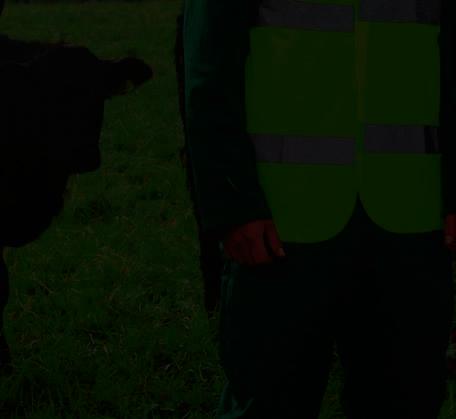

September 2022 15 MaecampwsGlynllifonar ystâdysblennyddGlynllifonger Caernar fonynarbenigomewn cyrsiau diwydiannau’r tir, yn cynnwys: •Amaethyddiaeth •AstudiaethauAnifeiliaid •Coedwigaeth aRheoli Cefn Gwlad •TechnolegDiwydiannau’rTir •NyrsioMilfeddygol Rydymyncynhyrchudabywar einffermfasnachol300er wa saifyngnghanol coetir,parcdir achynefinoeddbywydgwyllt, ac ymhlith ycyfleusteraua gynigiwnareincampwsmae: •Y GanolfanAstudiaethau Anifeiliaid •Y GanolfanBeirianneg •Blocaddysgu agostiodd £7.4Mi’wgodi •Efelychydd ‘Tenstar’ newyddgwerth£70,000 Bobblwyddynbyddein myfyrwyryncael canlyniadau rhagorol, ac blwyddyn diwethafy gyfraddllwyddiantarein cyrsiau amaethyddoloedd100% OurGlynllifonCampus isbased onthestunningGlynllifon Estate near Caernar fonand specialisesin arange of land-based courses,including: •Agriculture •AnimalStudies •Forestr y&Countryside Management •Land-based Technology •Veterinar yNursing Our300hectares of commerciallivestockfarmis surroundedby woodland,park and wildlife habitats,andour campus contains anumber of facilities,including: •AnimalStudies Centre •Engineering Centre •£7.4million teaching block •New £70,000 ‘Tenstar’ trainingsimulator Every yearourstudents achieve excellent results, includinglast year a100% pass rate inallagriculture courses. ColegGlynllifon: 01286830261 Caernar fonLL545DU www.gllm.ac.uk/glynllifon ymholiadau.glynllifon@gllm.ac.uk enquiries.glynllifon@gllm.ac.uk
Getting that balance

In farming, personal and professional lives often overlap and this can be the perfect storm for our relationships and own mental health. Two of our Student & Young Farmer Ambassadors share how they’re navigating this tricky terrain and why you’re not alone, even if you are struggling
COVER STORY
The family farmer: Mary Raymond

Since going into farming at the age of 17, I have loved every minute of it. I finally found something that made me excited and made me want to push myself. I never tried hard in school and I didn’t do well in my exams, but this was because it was something I wasn’t passionate about. But when I discovered how much farming spoke to me, I made it my mission to know everything there was to know. My family farm is mixed, so there are many enterprises in the business, and I didn’t want to stick to one; I wanted to have my foot in every fire.
However, when I went on this mission, I discovered how hard it was for me to balance the social life of a teenager with the demands of the industry I loved. I felt like I had to choose between going out and having fun with my friends and going to my job where I was having fun and being bombarded with information.
When I had a chance to go out, I was often too tired (due to getting up at 4:30am for milking) so I wouldn’t go, and when I wasn’t tired I would have to be getting up the next morning. It got to the point where I felt like a rubbish friend, and I was excited to go to university by the end of summer so that I could, in all honestly, just have a social life.
But there was a catch. Once freshers’ week was over, I quickly regretted being so excited to leave home, I found myself pining to go home, always wanting to know what was going on at the farm and feeling like I was isolated and away from everything that I loved – my dogs, my cows and, I suppose, my family.
When I went home for Christmas, I was so excited to be back to full-time farming (might regret saying that one day) and I dreaded going back to university, which I knew would be a problem, so I set myself the task of trying to enjoy the university experience as much as possible. This meant throwing myself into the deep end, trying not to contact home so much and really getting involved in life there.
At the end of my first year, I now cannot wait to go back for my second. I found the balance between having the best time in uni and going home to my farm where I can do what I love. I have years ahead of me to be at home and only three years of university.
“When I had a chance to go out, I was often too tired (due to getting up at 4:30am for milking) so I wouldn’t go, and when I wasn’t tired I would have to be getting up the next morning”
Work and life
September 202216
So let’s cut to the chase; farming is hard. Farming as new entrants with no prior experience and as a young couple? Crazy hard.
Two years ago, my now ex-girlfriend, Grace, and I set up with seven lambs on one acre before taking on a short-term tenancy on 40 acres, eventually getting up to 30 breeding ewes and 50 lambs (at this point I should probably say that Grace and myself are still very good friends and I honestly couldn’t be prouder of everything we achieved together).
We created our own lamb box business and lambed by ourselves in pretty much every weather condition you could expect on top of a hill in sunny (sorry I meant wet, cold and windy) Lancashire. No dogs, no quads, just two people, sheep and grass and a lot of coffee.
McDonald’s recently released some research revealing that more than 60% of young people are not considering a career in agriculture – and there’s a whole bunch of reasons, including: • access to land • investment capital • training.
Grace and I joined the NFU simply because, as two young people from Lancashire and Manchester, we had no clue where to start, and no idea that agricultural colleges and universities existed.

We had no clue about how to create a tenancy agreement, no clue about how to find land, and absolutely no clue on how to buy sheep!
This is a problem because the government has a solution on how to help farmers get out of the industry, but it hasn’t quite figured out how to get people into farming.
In ‘normal’ times, getting younger people into farming was always an issue. But combine that with Brexit, the highest levels of inflation since World War II and now the largest conflict in Europe since then too, as well as an ageing farming population and severe concerns about our food security… I’d say getting young people into farming should be getting bumped up a few places!
So why am I writing about any of this?
Well, as you may have gathered, myself and Grace aren’t together anymore, and we’re no longer farming, but not for a lack of trying. We were both holding down full-time jobs on top of the farming and trying to juggle our relationship and family
commitments – we gave it 100% and it just wasn’t enough.
On paper it would have taken us another three years to get to a size where one of us could have quit our job to have taken on running the tenancy full time. And in between all of that we would have had to have made some serious financial investments – we just didn’t have enough time and that’s something the industry is running low on.
We need young people, we need ambition, we need new ideas, new
thinkers, new solutions to new problems. We need new farmers. Not now, not tomorrow but yesterday. And no-one, noone in government or in farming is talking about the issue enough.
I may not be actively farming at the moment, but I still feel like I’m part of the industry and I will keep pushing for government to make changes to encourage new entrants like Grace and I. And, who knows, maybe at some point I’ll get my second shot at a profitable and productive farming enterprise.
CHARITIES AND HELPLINES
• The Farming Community Network 0845 367 9990
• Royal Agricultural Benevolent Institution 0300 303 7373
• Gatepost for RSABI 0300 111 4166
• Mind Infoline 0300 123 3393
• YANA (You Are Not Alone) 0300 323 0400
• Samaritans 0845 790 9090
• Survivors of Bereavement by Suicide 0300 111 5065
If you have concerns about somebody you know, you should always consider it to be a medical emergency and contact emergency services on 999.
The new entrant: Gareth Staples-Jones
“We need young people, we need ambition, we need new ideas, new thinkers, new solutions to new problems. We need new farmers”
Work and life
September 2022 17
From the ground up
NFU Cymru Ambassador Sian Davies reflects on establishing her own NFU next generation group at home in Wales

One of my ambitions as a Student & Young Farmer Ambassador was to give something back to my county, Brecon and Radnorshire. After much encouragement and support from the county team, we have established a next generation group for our community.
USE YOUR CONTACTS
So, where did I start? I contacted the Radnor and Brecknockshire organisers of the Young Farmers’ Club and asked to be part of their rural affairs group. This enabled me to network and meet members who may have an interest.
I then came up with a blueprint of what our group would look like, and individually messaged sons and daughters of farming businesses to see if they would be interested in joining.
I created a WhatsApp group and organised our first meeting in Builth Wells Rugby Club, an informal setting with guest speaker NFU Cymru Deputy President Abi Reader.
We are the first county in NFU Cymru to have a next generation group.
It will allow members from all parts of the county to interact with each other, share ideas and network across events. I feel this is something important for the farming sector to ensure young voices are heard and supporting each other.
As a group we can participate in county branch events and have input into the wider range of work NFU Cymru does for its members.
WHY CREATE THE GROUP?
Agriculture is in an uncertain time, with unknowns including future payments, tackling climate change, ensuring our land is producing food for the nation, all alongside caring for the environment. It means the need for
a collaborative group of young people to express their views is vitally important.
Implementing change within our businesses comes with risk but as young farmers we must be forward-thinking and do what is best for our future.
This was reflected in our first meeting, held in May, which had more than 30 members attending to listen to what we had lined up for the group and our Q&A session with Abi.
TOUGH CONVERSATIONS
I was overwhelmed by the conversation we had regarding carbon footprinting and members wanting to participate in a carbon calculator for their farm. Given how diverse the members’ backgrounds are (sheep, beef, poultry, holiday lets and rural professionals to name a few), it is an exciting opportunity to undertake this task.
Future study trips will include a visit to a soft fruit and arable farm, to the TB Centre of Excellence at Aberystwyth University, to an AD plant and to be part of ongoing events with NFU Cymru. We message on our WhatsApp group on a weekly basis with updates such as grant opening and closing dates, BPS/environmental schemes queries or any other issues. We also hope to support future consultations from the Welsh Government on the Sustainable Farming Incentive proposals.
Looking to the future, I always try to be positive and will support anyone who wishes to set up a group. Recently, I’ve even helped other NFU S&YF ambassadors to start theirs up and I’d be keen to hear from others interested in starting their own.
Want to get in touch with Sian about starting a group in your area? Follow her on Instagram @Sian_Eleri97
Toby Lea
Next Generation
September 202218
Fully accessible
South West Ambassador Sophie Bould-Lynch explains how communication can break down barriers and why inclusion matters
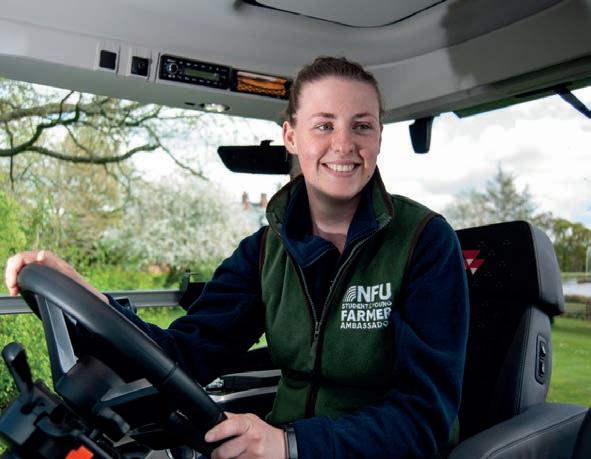 Lawrence Looi
Lawrence Looi
Growing up, life was incredibly tough. I was brought up with parents and immediate family being profoundly deaf or hard of hearing in some way. I have a twin sister and a younger brother, and we were all made to feel di erent because of the ‘world’ in which we grew up.
The amount of negativity that I used to, and still, receive is crazy and, sometimes, unthinkable. I got comments like ‘life must have been rubbish’ and ‘I can’t believe how you coped growing up’ – well for me, I haven’t known life any di erent. As I grow older, I realise I’ve have had so many opportunities and I’ve learned important life skills at a young age being the hearing child in a deaf family. My experiences mean I naturally include everyone as much as I can within activities or conversations.
Bridging the gap
For me, communication is a key skill. I do what I can to try and break down the barriers between the ‘hearing world’ and the ‘deaf world’. In conversations, I will use British Sign Language (BSL) and speak at the same time so everyone can follow the conversation. And yes, I appreciate most of the population does not know how to communicate in BSL, but a simple smile and wave can change the whole perception of a conversation and make the di erence to someone’s day.
I know reading this you might think ‘that’s easier said than done’, and it can be. However, my advice would be to take every opportunity and most importantly, help others to do the same. Why can’t we include everyone? Why can’t we learn to adapt? Technology has advanced and we need to
utilise this to our advantage for equality, inclusivity, and accessibility.
Inclusion in agriculture
Going forward, my aim is to include as many people from di erent backgrounds as possible in agriculture. I am currently in the process of creating short videos to educate people in agriculture; these range from the basics of where food comes from to putting together cookery videos to countryside awareness.

By speaking and signing the videos with captions, I can ensure that the 11 million people who are hard of hearing, and the 151,000 who use BSL, are included. I have also chosen to use dark-coloured texts on light (non-white) backgrounds, and to avoid green, red, and pink as these are colours that people with dyslexia and colour-blindness struggle with. It’s about educating ourselves, and simple changes like this means people feel included and a wider audience is reached.
SOPHIE’S TOP FIVE TIPS ON INCLUSIVITY:
3
Put yourself in someone else’s shoes, take a pause and think how they would feel. Sometimes that’s all you need to do.
No matter how rubbish a situation is, try and find the positive.
Take life as it comes, day by day.
Try not to stress, and find ways to look after your mental health if you do.
If you don’t understand something, do some research.
Inclusion 1
2
4
5
September 2022 19

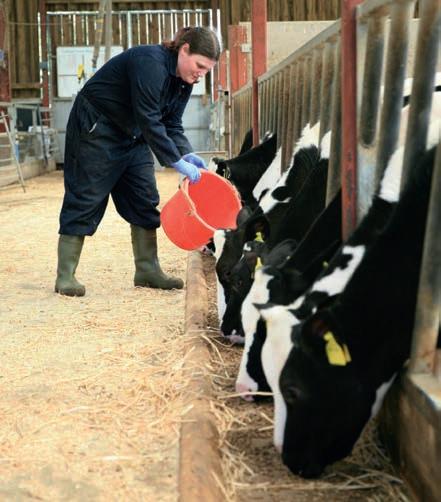
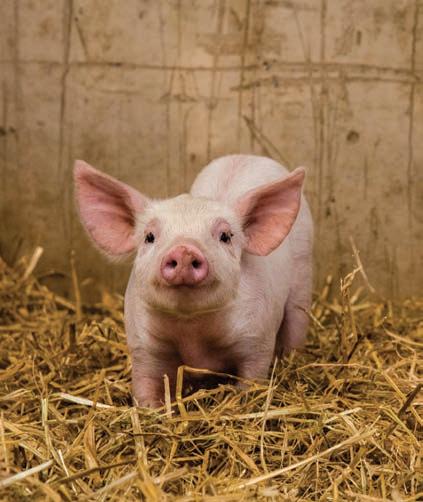











September 202220 AGRICULTURE COURSES • Foundation Level1 Land-BasedDiploma • Level2 Advanced TechnicalCertificate in Agriculture • Level2 Diplomain Land and Environment • Level3 Diplomasin Agriculture • Level3 Diplomain Agri-FoodEnterprise • TechnicalBaccalaureate in Agriculture • Apprenticeshipsin Agriculture STUDYAT REASEHEATH www.reaseheath.ac.uk/agriculture OPEN DAYS 22/23 Saturday8October Saturday5November Saturday3December Saturday14January Saturday11February Saturday25March Saturday22April Saturday10June www.reaseheath.ac.uk/ course-open-days COMINGSOON TLevelin Agriculture, Land Management andProduction(withLivestockProduction orCrop Production pathways)

































Agriculture Degrees •FoundationDegreein Sustainable Agriculturewith Dair yHerdManagement •FoundationDegreein Sustainable Agriculturewith LivestockManagement •FoundationDegreein Sustainable Agriculturewith CropManagement •BSc(Hons)Sustainable AgricultureTop-up www.ucreaseheath.ac.uk/agriculture Open Days 22/23 Saturday15October Saturday12November Saturday11February Saturday10June www.ucreaseheath.ac.uk/open-days UCR Study atUCR
Investigating soil potential
As input costs rise and net zero goals approach, the time to build a profitable and sustainable dairy business model is now. And utilising our soils’ full capabilities could be a big part of that, as West Midlands Ambassador Edward Lord discusses...

The current market uncertainty, and fertiliser prices tripling, inspired me to rethink our on-farm nitrogen policies.
I investigated the potential in our soils and how improving it can benefit crop quality, yield and cow health.
I believe soil is the greatest asset we have on farm. It contains a wealth of microbiology, organic matter and nutrients which provide the basis for crop growth, with balanced soils also having the potential to produce healthy, high integrity crops and to lock up carbon. I believe we must move away from conventional techniques and look towards a biological approach, such as:

• making sure ideal soil pHs are reached through good liming policies;


• optimal P and K indices by utilising the carbon cycle and composting farmyard manure;
• ensuring our soils contain a calcium to magnesium ratio of 68% to 12%. This can be altered by gypsum;

• creating aerated, microorganism-rich soil through feeding soil microbes with molasses and foliar feeds;
• encouraging no till techniques, where applicable, to build organic matter and lock up carbon;
• making sure the carbon to nitrogen levels of our soils are at a ratio of five to one to encourage microorganism biodiversity.
This thinking inspired me to complete a work placement on an organic dairy farm in Leicestershire that has focused on building soil health for 20 years. The farm's impressive grass growth and mixed wholecrop yields (which in many circumstances mirrored our own), with no artificial inputs, was an eye-opener. It showcases the real possibilities that can be achieved through correcting calcium to magnesium ratios, building biodiversity in the soils through foliar feeds and
sward quality.



while sustaining forage
using legumes extensively to fix nitrogen and increase sward quality. Therefore, our challenge and current aim on farm is to encompass a biological approach to managing our soils to reduce nitrogen input further, while sustaining forage quality and yield. Since identifying this, we have delved into composting farmyard manure using bokashi to boost organic matter and are applying slurry with a carbon source (molasses). We’re also currently growing a mixed wholecrop including spring barley, peas, red clover and vetch in the hope of providing an 18% protein winter feed. This should boost milk production and fertility and reduce concentrate input. Attaching the fertiliser spreader used to bring us excitement, yet, in this new era, each time I now question what mistake we may have made and how I can learn from it.
I may not be anywhere close to being a soil whiz and there are many new avenues to explore as our journey continues. However, I believe encouraging the limited understanding of soil science beyond soil pH and nutrient indices within our industry is essential as we look forward to creating climate friendly, biological dairy systems which can e ciently produce milk through fewer ecologically-damaging inputs.
Soil
September 202222
Take five with Erin
NFU Cymru Ambassador Erin McNaught

wants to inspire farmers to take a break and have a read about farming practices from further afield
I love reading books. For me, there is no better way of relaxing after a day on the farm than sitting in the garden, reading, with a cold drink and my dog Moxy by my side.
Dirt to Soil by Gabe Brown
With working on a regenerative dairy farm and beginning my own journey of taking over my family beef and sheep farm, I’ve been thirsty for any knowledge on di erent methods of farming. Reading allows me to find out what other people are doing.
What is regenerative farming?

Regenerative farming involves principles and practices that aspire to rehabilitate and enhance the entire ecosystem while producing quality, more nutritious produce. It's something I'm keen to learn about as much as possible, and so I was recommended this book by my boss. Ever since the first chapter I’ve been captured, but I know some of you may be sceptical. However, I would suggest you be open-minded and don’t shy away, as this book should be a must-read on any farmer’s book list.
A little bit about the book
Dirt to Soil is written around farmer Gabe Brown’s unique story of making bold choices. I'm inspired by the story of a city-boy-turned-farmer and have learned how his open thinking made him into a renowned farmer. I found it really interesting to read about farming further afield, as he is based in North Dakota. We learn about the market they sell to, their struggle with the weather, and the most worrying issue of our time – soil degradation.
Firstly, we hear about his realisation that the ranch (that he bought from his in-laws) was degraded. His crops failed and he blamed this on the di erent characteristics of his farm, like the soil structure that could not stand the brutal weather they received year on year. This led him into a desperate financial
To win a copy of Dirt to Soil by Gabe Brown, send your name, address and membership number to competitions@ nfu.org.uk by 31 October 2022.

situation. Gabe knew he had to do something di erent.
You will be fascinated by Gabe’s incredible journey of turning a conventional farm into a self-renewing, regenerative farm. Split into two parts, the book shares his grazing methods and how he re-thought how he manages the livestock aspect (if you're a livestock farmer like me, you are guaranteed to pick up a few tips in this part!). The second half is all about the bigger picture; going beyond his own farmstead, he discusses how his farming methods could work on your farm.
This book will revolutionise your mindset and farming ways. A mustread for any 21st century farmer, and as Gabe says: “A person is only limited by his or her imagination”.
I know some of you may be sceptical about regenerative farming. However, I would suggest you be open-minded and don’t shy away, as this book should be a must-read on any farmer’s book list
Soil
NET ZERO Visit NFUonline.com to see what the NFU is doing to help farmers on their path to acheiving Net Zero by 2040 September 2022 23
Measure
Use the many and various (and very often, clever) metering systems to work out where and how your energy is being used.
Invest in renewable energy Support your own consumption before considering large-scale, third-party systems.
Audit and re-appraise
The energy market is moving very quickly at the moment, and what’s true today might well be wrong tomorrow, so keep your ear to the ground and keep comparing what's on o er.
Stay friends
Your neighbours and local community will have a say in any large-scale project you do, so keep them onside and involve them wherever possible.
Claire Hartry from NFU Energy gives her top tips for being energy-e cient where you can Understand Take some time to work out where and why your biggest energy consumptions happen.
Do your research Speak to as many experts as you can about the possibilities for reducing energy consumption in your systems.
Create a plan
Start with the simple low cost/ low impact items to gain confidence in your solutions, work up to the bigger more impactful interventions.
TO BE GREEN ON YOUR FARM
Keep control
Look after your own grid connection and work out what’s possible before looking for a large-scale renewable energy partner.
Don’t just follow the crowd Your energy solutions will be di erent to others. There is rarely a one-size-fits-all solution, so make sure yours fits your business.
Call NFU Energy
The team at NFU Energy is here to help and can provide the insight, help and advice you are going to need.
Call 024 7669 6512 or visit www.nfuenergy.co.uk for more information.
Net zero
September 202224
A top priority
South West Ambassador Mike Wilkins
talks about what he’s doing on farm to help tackle the climate crisis
Most industries are waking up to the dire need for them to reverse their negative impact on our natural environment. While many are looking to ‘offset’ their way out of a climate catastrophe, agriculture has a rather unique opportunity to mitigate our climate impact internally, otherwise known as ‘insetting’.
As manager of a 1,400 hectare farming business, our environmental impact and contribution towards the NFU’s target of a net zero agricultural industry by 2040 is a top priority. I fear that if we farmers trade too much of our carbon and environmental capital out of our farming businesses (to oil companies, airlines, or other offset-hungry industries) we will undermine our own inherent ability to first achieve carbon neutrality ourselves.
The manufacture and application of inorganic fertilisers, such as nitrogen, make up around two thirds of greenhouse gas (GHG) emissions on predominantly arable farms like ours. Nitrogen fertilisers release nitrous oxide, which has around 300 times the global warming potential (GWP) of carbon dioxide. So, surely the answer is to stop using inorganic fertilisers? Not quite…
Feeding a growing population
According to expert Hannah Ritchie from Global Change Data Lab, it’s estimated that nitrogen fertiliser now supports approximately half of the global population. And many human foods produced on farms, such as milling wheat and malting barley, have highly specific nitrogen requirements to achieve the quality essential for their end use.

On our farm, we’re aiming to reduce our total nitrogen usage while maintaining the high levels required on our human-consumption crops. We believe that this requires a holistic approach to managing and mitigating our climate impact.
One way we are working to achieve this is within our crop rotations. On a 330 hectare farm, we have split the cropping into six 55 hectare blocks. One of these blocks, roughly 16% of the cropped area, is planted with a four-year herbal ley under the Countryside Stewardship option GS4. This requires zero inputs.
Reducing nitrogen by 16%
Averaged across the lifetime of the ley, in place of the alternative arable crops that would have been
grown, we will have reduced our total nitrogen usage by around 16% annually. Paired with a wider rotation of nitrogen-hungry milling wheats and lower input crops, such as canary seed and beans, we can have a significantly lower total nitrogen requirement, and higher environmental benefit, than a simplistic wheat/ oilseed rape rotation.
To further quantify the environmental benefits of our herbal leys, we are beginning a regime of soil and organic matter testing to better understand their impact on increasing carbon sequestration and improving soil health.
The bigger picture
Leys also have other benefits, including nitrogen fixation, supplying nectar and pollen, and providing natural wormers to livestock. This last point is particularly advantageous to the way we manage our leys, which is by grazing with our fully outdoor Exlana sheep. Using insetting, coupled with the extensive low input management of the flock, we aspire to produce lamb that is net zero.
Ultimately, stacking these practices with other tools such as agroforestry and renewables, I want UK agriculture to go beyond carbon neutrality into carbon negativity. That gives us a monumental and enviable opportunity to assist other industries, ones that don’t have our insetting abilities, to achieve net zero through offsetting. This will be key in enabling the UK to achieve its target of nationwide net zero by 2050.
Adam Fradgley
What are you doing on your farm to reach net zero by 2040? Tweet @StudentFarmer and let us know
Farm manager Mike Wilkins is keen to look at the global picture when considering his own farming practices
Net zero
September 2022 25
From tray to tummy
South East Ambassador and soft fruit farm manager Dan Hawes gives us the lowdown on how strawberries make it to the supermarket shelves


 John Cottle
John Cottle
September 202226
Move over Greg Wallace! Welcome to NFU Student & Young Farmer Ambassador Inside the Factory (on a scaled down size, but with just as much enthusiasm). There has been a lot of love and hard work put into producing the perfect strawberry – so how does it go from a growing plant to a punnet in a shop? Here’s how:

05.30
Picking begins. Your fruits are picked directly into the punnet you buy them in – it’s all about quality and e ciency.
Strawberries ripen at di erent stages, so the field will be picked every three days while it’s in production, only taking the ripe berries as workers pass.
06.00
The punnets are prepared in ‘field trays’, which contain 10 of the 400g punnets. Once the picker’s trolley is full, these are taken to a collection area on the edge of the field, and when a pallet is full (that’s around 750 punnets’ worth!) it’s taken away to cold storage.
06.10

The fruits reach the fridge – dropping the fruit temperature is key to maintaining the best quality and shelf life so the consumer can enjoy for longer – aiming for under 40C.

They will remain close to this temperature for the rest of their journey (but remember, when you get them home, take them out of the fridge and let them get to room temperature as this provides maximum flavour).
10.00
First pick up. The fruits are picked up and taken to the packhouse (also chilled). This is where the quality and weights are checked to make sure you get what you pay for.
Once this process is complete and everything is as it should be, the lid is heat-sealed on. This method is great as the seals use significantly less plastic than removable lids, and they’re tamper-proof! Food safety and traceability is key here.
From there, they are packed into customer (usually the supermarkets) trays, labelled, and placed in the next fridge ready for dispatch.
16.00
O to the shops! The refrigerated articulated lorries turn up and take up to 26 pallets of fruit at a time. These will usually head onto the supermarket's distribution centre before heading to your local store.
07.00
Your strawberries have arrived in store, and are on the shelves ready for you to enjoy.
Of course, it can’t always be within 24 hours. Fruit picked later in the day can’t always be processed same day, or delivered straight away, but that’s the beauty of keeping it in the fridge.
So next time you’re out in the shops (or farm shops and garden centres), keep an eye out for British strawberries with the Union Flag.
And if you’ve never thought about a career in fruit and fresh produce, take it from me, there’s plenty of opportunity out there!
Supply chain
Fraise facts: 1 Strawberries contain more vitamin C than oranges 2 Strawberries are good for your brain, muscles and heart – the ideal study food! 3 Commonly strawberries are red, but they can also be yellow, blue and white 4 Apparently if you sprinkle pepper over sliced strawberries and eat them, it keeps your teeth white (can't say I've tried it myself!) 5 Evidence suggests we've been eating strawberries since the Stone Age (imagine Fred Flintstone enjoying a punnet!) September 2022 27
I’m often asked whether I always wanted to be a farmer. The answer is yes. Alongside my twin sister, we are now the fifth generation on our family farm in North Yorkshire. After going away to study and a stint in other sectors (but still within agriculture), I ventured back to the farm just over a year ago. I can safely say that being a farmer is all I hoped it would be in terms of the opportunities to make a di erence.
Anyone who knows me knows that not even a year ago, I had only posted about three pictures on Instagram, and I didn’t even know TikTok existed, let alone how to put a video together. When I became an NFU Student & Young Farmer Ambassador, I really wanted to utilise the opportunity I had to spread positive messages about British agriculture. Cue my first ‘proper’ post! I spent ages trying to get the tone right, and had to pluck up the courage to click share as I didn’t have many followers, let alone anyone who knew what the NFU stood for. From there, I found I had lots of opportunities to take photos on the farm and beyond. What seemed to me to be a day-to-day job, such as foot bathing sheep, proved to be an eye-opener for lots of my followers who could learn about the time and attention which farmers give to their flock and to animal welfare. Now, I still take time when writing my posts to ensure that I’m relaying the right message.

Across the industry, every day I see inspiring farmers who are using their social media platforms to reach their sometimes tens of thousands of followers to talk about their sector and the challenges which they are facing on farm but also as a way to showcase their diversifications such as campsites, farm shops or direct meat sales. With a can-do attitude, a willingness to be as open as possible and a mobile phone, more and more people are able to promote their businesses and encourage people to support British agriculture through a photo or video and a quick click of the share button.
REBECCA’S TOP 5 SOCIAL MEDIA TIPS














1 BE HONEST
Showing the highs and the lows is not only authentic, it also resonates more with followers.
2STOCK UP
I’ve found it really helpful to have a bank of photos of farm life for those times when I can’t seem to get a good photo!
3 INTERACT




Speak to your followers. I’ve found using the question and poll boxes on Instagram stories a great way to find out who your followers are and what they want to learn about.
Follow Rebecca on Instagram @rebeccawilson722
4PICK YOUR BATTLES
Some people can’t be reasoned with, accept this and move on. I have blocked people and deleted comments if I think they are damaging to my message and not based on evidence.



5








ENJOY IT!
It’s easy to get bogged down with the constant nature of social media, but as soon as you stop enjoying it, you may lose your key messages.
North East Ambassador Rebecca Wilson discusses how to use social media in agriculture as a force for good and a way to promote our industry
Social media
September 202228
How to get into agriculture
WHAT OTHER OPPORTUNITIES ARE THERE?
Full-time on farm
While someone’s end goal might be to work in agriculture, there is not a ‘best route’ into the industry, or only one career. I have grown up on a mixed family farm in Bedfordshire. Initially, I wanted to be a land agent and I undertook two years of a degree apprenticeship with Harper Adams University. However, I have decided that my passion lies in education and inspiring the next generation about the importance of farming and the opportunities available within it. Therefore, I have continued my degree at Harper Adams as a full-time student with one year left to go!
There is no one defined route into the agricultural industry and we need people from all types of background to get involved. Whichever route you may take, remember that you are the future of British agriculture!

Education
Agricultural colleges allow you to build the foundations of the subject you wish to learn about, whether that be agriculture, animal care or countryside management. Colleges allow for more of a focus to be placed on a single subject in comparison to A-Levels.

Employment
Agriculture does not just mean farming, there are so many other employment opportunities within the industry. If you have a keen interest in biology, have you considered plant breeding as a career? If you are interested in computer science, have you considered precision agriculture? How about farm animal nutrition or genetics?
University and apprenticeships allow you to build on these foundations. They provide a deeper understanding of matters and issues within agriculture (if you are studying agriculture). This route allows you to gain lots of knowledge, so when you are looking for jobs, you are able to display a large amount of technical insight.

If you are currently working on a farm, have you considered upskilling? It is very useful to have other qualifications which can increase employability. Have you considered undertaking your PA1 and PA2? Would a telehandler certificate benefit you? What about completing a chainsaw course? How about a hedge-laying course?

While doing A-Levels, college or university, many students will use the holidays to gain some experience on farms. This can be very useful for the future, as it demonstrates to future employers that you have a range of experience. If you are interested in agriculture, then I would encourage you to get some experience to see if the job is for you!
Farming includes many di erent roles, such as farm workers and farm managers.
Harry Mo at, an Assistant Farm Manager told me why he loves what he does: “I am really enjoying applying what I have learned, with the ability to make my own decisions.” Rural surveying
Rural surveying is varied, including tasks such as preparing farm budgets, negotiating a compensation claim or looking at a planning application for a barn conversion.
Chartered Surveyor Lucy Bates explains: “Being a chartered surveyor is brilliant. I enjoy the variety of the work, having the opportunity to build relationships and a good rapport with clients.”

Agronomy
An agronomist assists farmers in making decisions in regard to inputs or practices for their soil management and crops.
Agronomist

Ed Schofield says: “I enjoy my job because no two days are the same. Every day I work with di erent people on di erent systems and farms, solving problems, guiding and advising in all aspects of the farm business. The whole job is very rewarding.”
 East Anglia Ambassador Thomas Saunders looks at di erent routes into the agriculture industry
East Anglia Ambassador Thomas Saunders looks at di erent routes into the agriculture industry
There are so many opportunities to work within the industry, some of which are outlined below:
How to get into agriculture
September 2022 29
Easy peasy lamb chop squeezy

West Midlands Ambassador Bizza Walters talks about why eating seasonal produce is important for our farming community and the environment

Is there anything better than eating a meal when the produce has been either grown by yourself or purchased from local farm shops and producers?
Not only does it taste better, it also feels so good knowing that the food you are consuming hasn’t flown thousands of miles to get on your plate, and you are supporting our British farmers!
We are really lucky at home that we can grow our own veggies, and we have an abundance of fruit on the farm, from blackberries to apples to damsons. We are sheep farmers, so lamb is regularly on the menu at dinner time, especially during the spring and summer!
I recently had a friend come to visit, and we agreed for lunch we would cook a completely home grown and produced meal – lamb chops, potatoes, asparagus and herbs from the garden and WOW was it good. I am not a cook, but luckily, she is a TikTok foodie (Follow her @haribeavis) so she walked me through her recipe, and it was so simple that even I can make it on my own now (a big achievement for me)!
After-dinner reading
I really can’t stress enough how important it is to be buying locally and seasonally and supporting our British farmers, because without them, we would be in serious trouble. Agriculture across the world is going through a turbulent time, and the UK is currently only around 60% self-sufficient; we have the ability to increase this to at least 80%, so let’s all do our bit to get there! By eating local and seasonal food, you are reducing your food miles, eating nutritious food with meat produced to the highest welfare standards, and putting money back into your local
Don't get scurvy September 202230
economy. I was in a farm shop recently and overheard a couple in their late twenties asking if they could sign up for a weekly meat and veg box, and it made me so happy to hear.
Challenge yourself
A little challenge to finish off with – during the next four weeks, see if you can source the majority of your food within a 30-mile radius of where you live. You should
Here is the step-by-step guide and ingredients list to make the most delicious and easy lamb chop meal for two:
1. Gather all your ingredients. We got ours from the garden (and chops from the freezer).
2. You can get all the veggies from your garden if you grow them, or your local farm shop/greengrocer. Your meat can easily be sourced from your local butcher or farm shop too, maybe your local farmer does meat boxes (just ask them!!).
3. Put some water on to boil for the potatoes and sprinkle in a pinch of salt.
4. Pre-heat a pan on the hob or range with lots of butter, and add in the garlic and rosemary.
5. Once the potato water is boiling, pop the potatoes in along with the sprigs of mint.
6. Prep the chops by smearing them in olive oil and salt and pepper.
7. Add the chops to the pan and let them cook in all the delicious, garlicy, butter for 3-4 minutes on each side.
8. Drain the potatoes once they are boiled, put them in a dish and add in a knob of butter.
9. Take the lamb chops o the heat
be able to do this with your meat, fruit, and veggies. There is so much in season at the moment – potatoes, tomatoes, strawberries, raspberries, rhubarb to name just a few! Give it a go, and I would love to hear how you get on. Big thanks to Hari Beavis for the pictures and recipe, and teaching me the basics of cooking!
Follow Bizza on Instagram @adventuresofashepherdess
You will need...

• Lamb chops x 2

• Some new potatoes
• A couple of sprigs of mint and rosemary
• A handful of asparagus
• Garlic cloves x 3 (or more if you’re a garlic fiend!)
• Butter
• Olive oil
• Salt and pepper
• Mint sauce
and leave to rest on the side (this is really important).
10. Pop the asparagus in the pan to cook in the juices from the lamb chops (trust me, it’s a game changer). Don’t leave it too long though – I few minutes will be enough so your asparagus still has that perfect bite!
11. Plate everything up with some mint sauce, drizzle any remaining juices from the pan over the chops/ potatoes and VOILÀ – you have an easy, delicious, and locally sourced and produced meal!

12. We finished o by going out into the garden and picking some strawberries to have with some locally made ice-cream.
ARE YOU THE NEW FACE OF FARMING?

The Black Farmer and Writtle University College (WUC) are on a crusade to stop the drought in diversity within the food, farming and agricultural industries. The search is going to take place outside of traditional farming circles to encourage young people from diverse backgrounds to consider farming as a career.
The all-expenses paid residential weekend will be held at the University College's countryside campus on 31 March to 2 April and will o er teenagers aged 16-18 a taste of farm life.
Wilfred Emmanuel-Jones, aka The Black Farmer, explains: "As a young boy living in inner city Birmingham and with an interest in farming, it was impossible to find the opportunity to develop this interest. Fifty years on nothing has changed. Many young people interested in food, farming and agriculture do not know where to go to explore and develop their interest. This scheme is the first step in bringing about much-needed change."
Wilfred, who was awarded an MBE for services to farming in 2020, adds: "It is my mission to encourage more youth and diversity into farming and agriculture, so to be able to work with Writtle University College on these initiatives is tremendously exciting."

At the age of 40, Wilfred fulfilled a life-long dream when he purchased a small farm on the Devon/ Cornwall border, the inspiration for his The Black Farmer brand. His brand tagline "without frontiers" encapsulates his drive to ensure more people have the chance to live and work in rural areas.
To find out more and to apply, visit writtle.ac.uk/new-faces-for-farming
September 2022 31
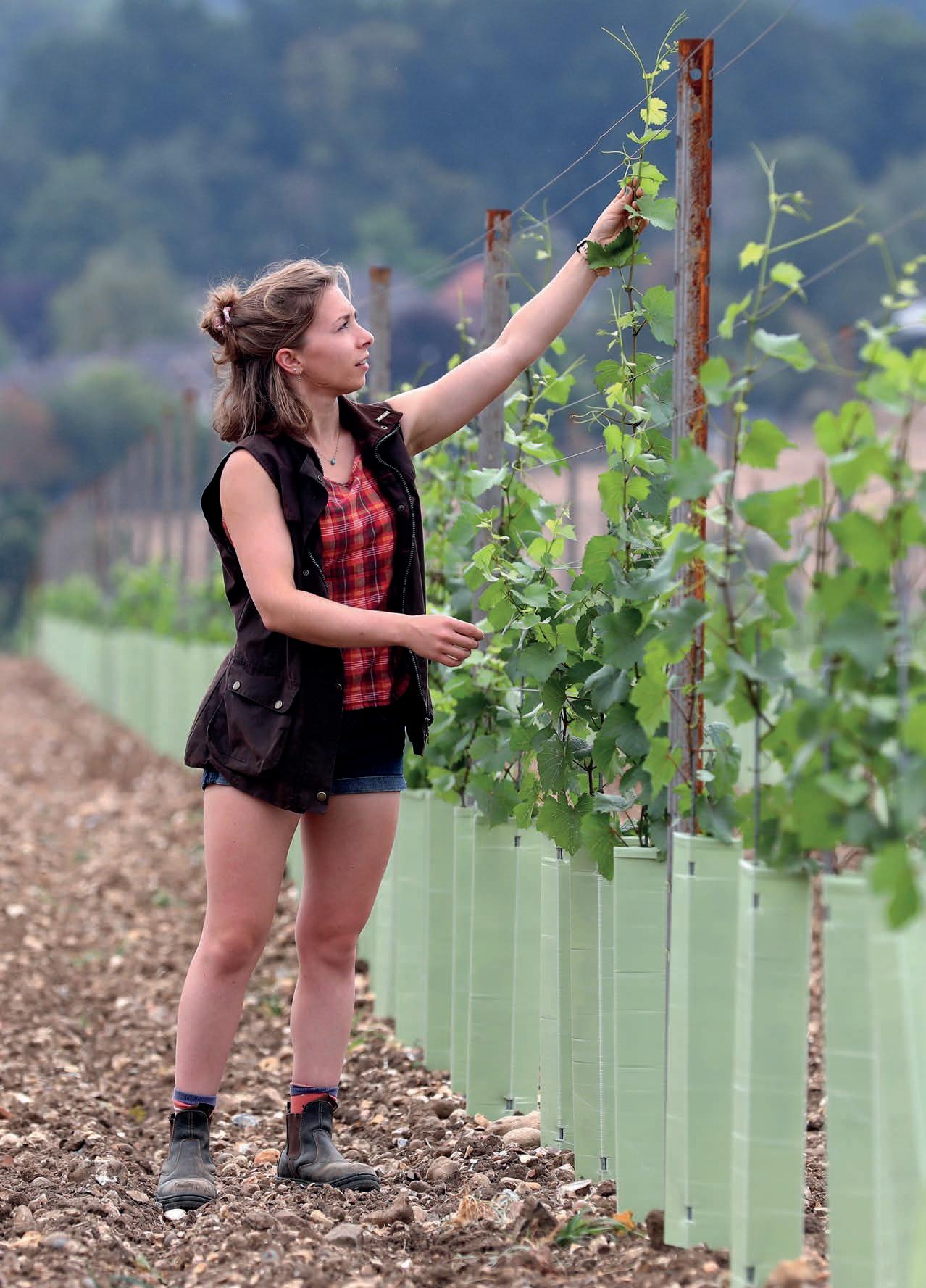
COVER STORY Whether you are a farmer or not, imagination and determination are key to building your diversification business, according to East Anglia Ambassadors Hannah Buisman and Emily Brown Diversification DESTINATION DIVERSIFICATION September 202232
Diversification has become a vital income stream for many rural businesses, and so we are taking a trip to Destination: Diversification to explore our businesses and what the future holds for your next venture.
Hannah: Super excited to chat today with you Emily about our diversifications and future plans. To start with, what is your background, and why did you decide to diversify?
Emily: I come from a mixed family farm in Bedfordshire, which we have farmed since 1947. We farm 500 hectares (mainly combinables with some grass) as well as turkeys, pigs and cattle, most of which go through our farm shop. My family diversified to add another income stream to the farm; it fitted well with a desire to have more livestock on the farm and it also kept my mum happy who prefers livestock to arable. How about you?
Hannah: I was brought up on an arable family farm in Hertfordshire in a bilingual household and studied languages at Durham University. Having returned home with a fresh, global perspective, I started managing our new vineyard enterprise while assisting with the arable farm and office. The farm has a great diversification portfolio thanks to my parents. They built this up as a means of supporting the arable business which is prone to peaks and troughs, while adding variety to our roles, which keeps things interesting! What is your role in the business?


Emily: Having been at University at Harper Adams over the past five
years, where I studied Agriculture with Farm Business Management, I help out whenever I can in my spare time (especially during busy periods such as harvest and Christmas time with the turkeys and the farm shop). I am fortunate that my dad is pretty forward-thinking and we have great discussions on any ideas I might have for the business going forward.
Hannah: I am guessing you have learned a lot as a result?
Emily: Without a doubt, it has shown me that at times you just have to put your head down and keep going until the job is done properly. I have also learned that it can be challenging working with family because there is little escapism at the end of the day; work doesn’t stop when you go home. They say farming is a way of life, not just a job, however it is really important to have time away from the farm.
Hannah: I completely agree, the biggest challenge I have faced is work-life balance. As a business manager, it can be really difficult to step away from your work, especially when working with family. It is easy to feel like you are letting the side down if you are not working all the time. Balancing my jobs can be a real challenge and it has been a steep learning curve realising I need to take breaks and leave business at the door.
Emily: I would add that it is important not to be afraid of trying something new. Even if you think an idea is really bonkers, you don’t know unless you’ve tried it. If it doesn’t work, learn from it and move on, we can’t always get things right 100% of
Emily Brown on her family farm in Bedfordshire
Diversification
September 2022 33
TOP TIPS
• Research is key.
• Try filling in a ‘lean canvas’ start-up business planner map.
• Look for a business mentor at university, the Prince’s Trust, The Henry Plumb Foundation etc.
• Network: Connect and learn from others in your sector, they will fasttrack your business.
• Don’t be afraid of trying something new. If it fails, learn from it and move on.
• Not all types of diversification will suit your location. Look into target markets and investigate any gaps in the market.
• Reach out and visit other farms/businesses across the UK and other countries - broaden your
the time. What made you take the plunge with the vineyard?
Hannah: My parents have been considering a vineyard for more than 20 years. The soil and aspect are ideal, and finally the industry and climate have caught up too. English wine is now a thriving sector, with the infrastructure and expertise to match. We still wanted to be a grower, but rather than be a price taker, we will be a price maker, giving us greater control and stability over our income. I have previous experience in the sector and offer stability for the future, so my return was the green light. We also love wine!

Emily: That’s great! How did you go about learning how to start your venture?
Hannah: With any new venture, research is key. I had never started my own business before, let alone one with such responsibilities. I called on experts in the field to help establish the viability of the business, while visiting other vineyards and networking. You mentioned you are exploring new ideas, what are you planning?
Emily: For my university dissertation, I researched the feasibility of diversifying into a farm gym. I love sports as well as farming so it is a great way to combine two of my passions.
Hannah: Amazing! How did you set about exploring this possibility?
Emily: Social media and the internet were the starting points to search for other farm gyms. I also researched various themes such as the benefits of exercising indoors vs. outdoors, using academic journals and reports. For more detailed research, Google Scholar can be a great place to start. If you were to start again, is there anything you would you do differently?
Hannah: In business, there are plenty of ‘what ifs’ and it is easy to get hung up on these. However, if anything, I would say to myself: talk to others, use their expertise and don’t worry so much, as it usually works itself out in the end. Do you have any tips on how to overcome any feelings of doubt?
Emily: Show the evidence and research to back up your plan, that will help to support what you are trying to do. Also, identify your unique selling point (USP) to set you apart. Lastly, if you believe in something then go for it; passion, determination and
hard work will always go a long way.
Hannah: Very true! What is the bestselling product in your farm shop?
Emily: Our Old English sausages, made using our home-reared Oxford Sandy and Black Pigs! Finally for some quiz knowledge, how many grapes does it take to produce a bottle of wine?
Hannah: Roughly speaking 1 vine = 1 bottle, so I would say around 700 grapes. We have planted roughly 25,000 vines, so quite a few bottles!
horizons. Diversification DESTINATIONCONTACT DETAILSABOUT LOKKELEBERY VINEYARD Website: lokkelebery.co.uk Instagram: @lokkelebery_vineyard Set to produce high quality still Rosé as well as sparkling wines from 2025 BROWNS OF STAGSDEN FARM Website: brownsofstagsden.co.uk Instagram: @browns_of_stagsden Family-run farm shop, set on a working family farm FARM FITNESS Website: farmfitness.co.uk Instagram: @farm_fitness Located in the glorious countryside, break into a unique style of functional training which is accessible to all fitness levels September 202234
Getting involved
East Midlands Ambassador Jess Langton on why putting your hat in the ring will give you opportunities you may never have thought possible
I’m a dairy farmer from Derbyshire, milking a pedigree herd of Locklan Holsteins and Friesians. Following part-time work for Genus ABS as a reproductive management specialist, I joined its graduate scheme in September. I’ve always found agriculture to be a diverse industry with a vast range of opportunities and I’d like to explain how I went about making the most of them.

Growing up, I was never too sure what I wanted to do. However, I adored helping my Grandad on our family farm which formed the roots of my passion for the dairy industry. Science was my favourite subject at school, so I paired this with my love of cows to study Animal Science at the University of Nottingham. There, I found myself looking for opportunities and challenges to stretch me and to broaden my knowledge of the industry.
Thriving under pressure and relishing challenges I joined the Genus Insights programme
as a reproductive management specialist, which involves visiting herds and artificially inseminating cows. With the pandemic striking during my first few years at uni, I was able to work while studying remotely, which benefited my mental health and wellbeing immensely.
Pushing myself out of my comfort zone led to me taking part in the Farmers Weekly ‘Farmers Apprentice’ in 2020. This was an incredible experience that gave me an insight into many di erent aspects of the industry and had me working with nine other farmers to overcome challenges. I soon realised how inter-linked our industry is and that I needed to broaden my knowledge, which led to me getting involved with the NFU.
Apply, apply, apply!
I became more active at a county level and saw the position for dairy board appointee advertised in British Farmer & Grower magazine. Reading through the criteria, I knew I checked all of the necessary boxes, but I was
still having doubts that my age would ruin my chances of a position on the board. After a small motivational talk with myself, I sent my application. I couldn’t believe it when I was asked for an interview and selected to be on the board. Being passionate about dairy and overcoming my self-doubt now means I can contribute to the future of the dairy industry!
Seeing the extent of the NFU and the work it does, I’m now also an appointee to its Next Generation Forum and a Student & Young Farmer Ambassador to try and increase my impact and involvement with the industry further.
I’ve found the National Federation of Young Farmers and other farming organisations, such as Holstein Young Breeders, to be fantastic doorways into the industry and I’d strongly recommend getting involved with those too.
If I had one piece of advice to leave you with, it would be push yourself out of your comfort zone and take every opportunity given to you, as you never know where it will lead you! Jess on Instagram
John Cottle
Follow
@Jess.Langton Participation
September 2022 35
Consumer perceptions
Maisie Bruce, a final year student at the University of Reading, was the recipient of NFU sponsorship for her final year dissertation. Here, she discusses her findings
The aim of my study was to understand consumer perceptions of the environmental impacts of chicken poultry production, from where and how their opinions are formed and how aligned they are to the true picture.
Why this subject?
Worldwide, the poultry industry is one of the leading, largest and fastest growing agricultural sectors and I was interested in why consumers might have different perceptions of chicken poultry production.
Chicken products are deemed nutritional, tasty, versatile, healthy and affordable. However, some media channels have identified a picture of poor practices when it comes to food safety, product quality and bird welfare. This has, to some extent, influenced the public, created doubt, and formed negative perceptions of the industry.
From an environmental point of view, poultry’s footprint is relatively
low in comparison with other livestock production. However, recent media interest in the environment has put poultry production in the spotlight. This exposure, the public’s growing concern for the environment, the size of the poultry sector and the previously presented image of the industry, make it likely that environmental concerns linked to poultry production will increasingly feature on the public’s radar.
Research beginnings
The first task was to establish what the main environmental concerns associated with chicken production are. Following an in-depth, scientific, literature review, the NFU helped me contact farmers across the UK from all sectors of the poultry industry (i.e. broilers, layers and hatcheries).
Environmental themes that emerged included global warming, pollution (air, groundwater and soil), resource use (energy, land, water) and the actual poultry production processes. Once
identified, these themes were then worked up into an online consumer questionnaire; 510 consumers participated in the survey across different age groups.
What was discovered?
The study found that consumer perception of the associated environmental impacts of poultry production were mixed and originated from a range of sources, which varied by age group. Some understandings were aligned with the expert analysis and others were not. Also, that the interrelationships between different impacts were not necessarily reflected in a consumer's rating of individual environmental issues.
It was found that consumers lack accurate information. Looking at media reports, it can be assumed that most consumers are generally aware of global warming, acidification and eutrophication potential that can have an impact on the environment. Poultry production is not seen to be the leading issue in environmental

Dissertation
September 202236
reports; however, this could easily change.

The research showed that consumers absorbed their information from across the media spectrum and that their source channels changed with their age group. The industry needs to deliver balanced, timely information to consumers in packages via channels they can understand and relate to. This needs to happen before other influencers seize the opportunity to communicate and create misleading or inaccurate perceptions of the industry.
The farmer interviews showed that they are aware of the potential environmental impacts of production, and in general, they make choices and decisions to mitigate impacts.
Farmers see the issues not only as environmental, but as critical for bird welfare and the economic sustainability of their businesses.
Consumers perceive fossil fuel and chemical use to be major environmental issues related to poultry production. This is not surprising; from the media, the public may be aware of the damaging environmental impacts of fossil fuel use, emissions and chemicals (for example, pesticides and fertilisers) across human activity, including agriculture. What the data did not indicate was any consumer awareness that levels of fossil fuel and greenhouse gas emissions are relatively low on poultry farms, or that farmers are working to restrict chemical use and are increasingly reducing the issue.
When asked about the disposal of poultry manure, responses seem to indicate that consumers are not aware of the large quantities of manure produced, and storage and disposal issues. But they are aware of potential issues around agricultural by-product run-off and leaching into soil and groundwater.
Another example is that, contrary to farmer input, consumer perception is that on-farm land use would also be environmentally damaging. This response could also be expected as consumers might be aware of marketing images of chickens roaming on open grassland, and media reports of the development of new American-style, large scale housing units.
When considering resource use for growing feed concentrate for on-farm use both poultry farmers and consumers reported this is a potential environmental
issue. Farmers believe that the combined environmental impacts of growing feed will be a significant future issue. Consumers’ responses, again, are probably to be expected, as the media report regularly on worldwide deforestation and land-use change of natural vegetation land converted to agricultural use. Media coverage does not currently significantly link poultry feed concentrate to soya grown on deforestation land, so it could be that the consumer responses are linked to their perception of agriculture overall.
Organic production is another environmental issue that could have been media influenced. If media reports included, for example, the inefficiencies of poultry feed conversion ratios, or the effects of slower production cycles, the consumer responses may have been less positive towards organic production of chicken.
What now?
Research recommendations are that the industry should improve communication with consumers and groups (such as the media) who might influence them. The objective would be to bridge gaps in consumers’ perceptions and proactively tackle incorrect and misinformed media damaging to the industry.
At COP26, the NFU acknowledged that better communication with consumers and influencers is needed to demonstrate the progress already made towards the NFU’s Net Zero by 2040 goal.
Environmental challenges will be an increasingly important issue for the poultry sector, as they will be for all industries, but it could be harder to influence the attitudes of consumers if they already have preconceived perceptions of the industry.

“Chicken products are deemed nutritional, tasty, versatile, healthy and a ordable. However, some media channels have identified a picture of poor practices when it comes to food safety, product quality and bird welfare.”
Dissertation
September 2022 37
How to plan for succession
It's always a tricky subject, but Mark Weaver of farm business consultants CLM shares his tips on how best to broach the topic of succession planning with family
1PICK YOUR MOMENT
Don’t choose a busy time. A period of relative quiet, when everyone isn’t exhausted, will be more e ective. Remember, the earlier the conversation is started, the easier it is to have.
2 DO YOUR PREP
Writing down key points can help you organise your thoughts. Fully understand your own aspirations and try to remove as much emotion as possible from the conversation.
3DON’T SPOOK THEM
The aim is to make your family want to talk about the subject, rather than make them feel uncomfortable or even see it as a threat. Stress this is in no way about you trying to wrestle control from them. Remind them a succession plan is important for the long-term financial future of the farm.
4THIRD-PARTY
Having an independent, objective person in the room (perhaps a trusted family friend or an adviser associated with the business) can bring clarity and calmness to proceedings, as well as ensuring momentum is maintained.
5SLOWLY-SLOWLY
Some succession plans work best when a member of the next-gen initially takes responsibility for one enterprise. Is there one you are particularly keen on and experienced in you could lead on? Agreeing some goals and measures of success for this could be a way for you to demonstrate your competence and ambition.
6
NUMBER-CRUNCH
More established members of the family business will be likely to take the conversation seriously if you come up with a plan showing your suggestions for how the business should move forward. Provide some details and figures, but don’t present these as a fait-accompli. This is a starting point.
7HIGHLIGHT THE WINS
Preparing for succession is about making sure everybody is doing what they’re best at – and what they want to do – for the overall good of the business and everyone associated with it.
8

BE FRANK
Set out in an honest, constructive and collaborative way what your hopes and dreams are. Make sure everyone feels comfortable sharing their opinions and let everyone have their say. This will usually involve siblings and potentially the wider family, too.
9
LISTEN
Try to see things from other people’s point of view. It’s understandable why some parents are reluctant to engage with this topic, because it can be hard to take one’s hands o the reins and no one wants to feel dispensable. Some negotiation – and ultimately flexibility – on all sides might be necessary.
10
KEEP GOING
View this an ongoing process, rather than as a one-o conversation. Don’t be disheartened. Being proactive can save time, money and heartache.
Succession September 202238

• MoretonMorrell // September24thandOctober8th • Pershore // November19th
Maxim isingt he valueof your wool
Freehaulagefromall Br it ishWool drop-off sites.
We understand that ourmembers face increasingcostpressure, whichis why alldeliveries to Br it ishWooldropoff sitesnow benefit from free onward haulage
As afarmerco-operative ownedbysheep farmers, everything we do is about adding valuetoBritish wool to maximise theret urns to ourmembers.Wedothis by efficiently collecting,grading andselling Br it ishwool, minimising pr icevolat ility andmaximisingret urns



We recognisethatwoolpriceshavebeenunder pressurebut,inthese uncertain times,you know it pays to stick together.And,w ithour expandingnetwork of collection sites, it hasnever beenmoreconvenient.
To findyournearest site visit br it ishwool.org.uk/depot- network
Together we’regrowing somethingspecial.
